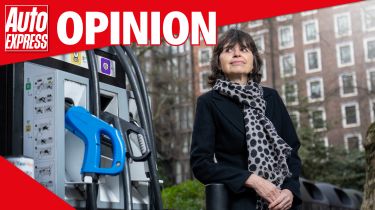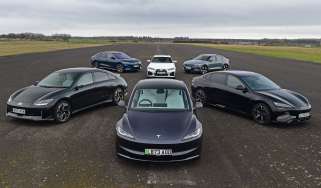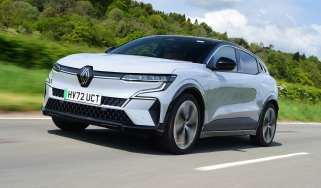“Government EV strategy needs a rapid recharge”
Baroness Kate Parminter, chair of the House of Lords Environment and Climate Change Committee (and a Nissan Leaf driver), writes exclusively for Auto Express following its inquiry into the UK’s EV strategy

Electric Vehicles (EVs) have been high on the news agenda in recent months with a raft of articles and policy announcements. The Government announced an end to the sale of new petrol and diesel vehicles from 2035 to support the transition from fossil fuel vehicles to EVs, but is the Government doing enough to help you decide to buy an electric car?
An inquiry by the House of Lords’ Environment & Climate Change Committee sought to investigate the progress the Government is making towards reducing surface transport emissions from passenger cars through an EV revolution. And reducing surface transport really matters to a net zero future, as it is the highest CO2 emitting sector in the UK. So, the switch to EVs is vital if we are to make those much-needed dramatic reductions in emissions, alongside the benefits of improved air quality.
The transition to EVs is a complex challenge which requires a sustained and coordinated approach led by Government across a number of industries and sectors such as the car manufacturing industry, Local Authorities, the EV charging sector and the National Grid. In some areas the Government has made good progress towards this target, including setting mandatory targets for manufacturers to sell an increasing proportion of EVs each year. But there are many areas where the target is off track, and consumers in particular are being let down by a combination of poor information, insufficient charging infrastructure and barriers to affordability.
High prices
We found that progress towards the 2035 target is not happening fast enough and many barriers are still in place for consumers wanting to switch to an EV. For many consumers the cost of purchasing a new EV is currently unachievable, especially when compared to petrol and diesel equivalents. Additionally, we also found that the range of EVs available is not yet satisfactory with too much emphasis on the luxury and SUV market and not enough on affordable family cars.
We are calling on the Government to introduce grants to help with the upfront cost of EVs, until the market matures and EV prices come down. Many of our European neighbours offer financial incentives to consumers to make EVs as affordable and. the UK could do more to support uptake. We also call for the Government to monitor the range of models available on the market to ensure that the right range of vehicles are available to consumers.
Beyond new EVs, our inquiry also found that second-hand EVs may still be unaffordable for the large majority of prospective buyers, in part because of the high proportion of new luxury and higher-value cars that currently make up the second-hand car market. We recommend that the Government investigate incentivising the purchase of second-hand EVs including options such as grants or interest-free loans. Consumers are also anxious about the longevity and health of batteries in second-hand cars. We recommend that the Government collaborate with industry to develop a reliable battery health standard to support consumer confidence in second-hand EVs.
Charging issues
Up to 40 per cent of UK households are unable to install home chargers and are entirely reliant on the public charging network which in many areas of the UK is insufficient. The Government has missed its own targets for the number of EV chargepoints at motorway service stations and the provision of public chargepoints across the rest of the UK is variable. In addition to the patchy progress with the charging network, consumers remain anxious about whether and where they can charge EVs reliably, quickly and at affordable prices. If you have these concerns you aren’t going to buy an EV.
To get back on track, the Government needs to turbo-charge the rollout of public charging to give consumers confidence that in purchasing an EV, they can reliably charge their cars . This will mean reviewing and updating planning regulations to support chargepoint installation and further supporting Local Authorities to deliver charging equitably across the regions of the UK. In addition to being available and reliable, charging also needs to be affordable and reasonably priced. At present, public chargepoint users are charged a higher rate of VAT than those using home chargers. To redress this disparity, we recommend that the Government equalise VAT rates across domestic and public charging to ensure that EV drivers without access to home chargers are not being unfairly discriminated against.
As I know, driving an EV has much to recommend it. It’s quiet and smooth, as well as having lifetime costs that should be cheaper than ICE equivalents. There is a lot of misinformation out there and accurate information needs to be communicated, as do the wider societal benefits of improved air quality and reducing critical emissions. It’s an urgent job for Government in collaboration with industry and consumer bodies. But it must go hand in hand with overcoming the current barriers to getting people to adopt EVs – the hurdles we highlight of upfront costs and a concerning lack of charge points.
Only 3 per cent of cars on UK roads are currently electric. Meeting the 2035 target requires a rapid recharging of the current Government strategy, putting improving public confidence in EVs at its heart. A failure to act on our recommendations will mean the UK will not reap the benefits of better air quality and will be stuck in the slow lane on its climate change targets.
Click here for our guide to electric car charging in the UK...



